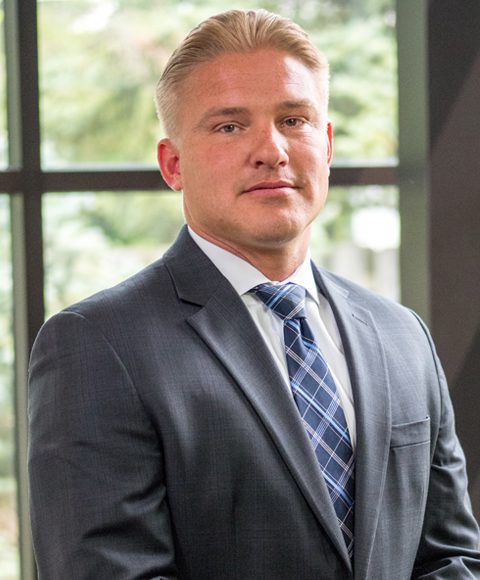For some veterans, accessing benefits to which they are entitled can be a difficult process. Aside from lots of paperwork and filing deadlines, there often is a perception that someone else needs the benefits more or that the veteran is self-sufficient and really doesn’t require assistance.
Anthony Kuhn, a service-connected disabled veteran and managing partner at Tully Rinckey PLLC, knows the feeling all too well.
“I waited far too long to go and apply at the VA,” he said. “You’re thinking that, one, somebody else needs it more so you’re not going to go and you’re not going to do it. Two, you’re thinking, ‘Well, I’m young, I’m tough. I’m going to tough it out and I’m going to fight through this and I’ll be fine.’ The reality is that there’s no difference between service-connected benefits and any employer/employee-related disability. It’s the same thing. You have this disability as a result of your service in the military and you’re entitled to those payments.”
According to data released in 2015 by the U.S. Census Bureau, there are 19.3 million veterans nationwide. Of that number, 3.8 million were listed with a service-connected disability rating. More than 1 million have a disability rating of 70 percent or higher.
The process isn’t easy, Kuhn said, and veterans applying for benefits must meet certain criteria. Service-connected compensation is available to veterans without a dishonorable discharge. He said there are a number of things to consider.
“First, you have to show that you have an existing medical condition or disability,” he said. “Second, you have to show that there was some type of medical condition that was either incurred or aggravated while on active duty. The third thing is that you have to be able to show a nexus between the two. You have to be able to link the incident on active duty with the medical condition you currently have.”
All three can be established through medical records or a “line-of-duty investigation,” according to Kuhn.
“That’s when you get injured on active duty and there is paperwork and an investigation that gets done that says whether or not it was aggravated or incurred on active duty,” he said.
Records from the federal Department of Veterans Affairs and records from civilian doctors can be used. Once a veteran applies, the VA will go through all the evidence and determine whether the person is eligible for benefits.
The VA conducts additional exams, called the “compensation and pension exam,” Kuhn said, in order to determine the severity of the condition.
The VA uses a scale for each percentage in order to determine how much a veteran will receive.
“You have to exhibit some symptoms, not all,” he said.
For instance, if a soldier is hit by a roadside bomb and suffers traumatic brain injury, a medical disability retirement may be granted. He said those are evaluated by the soldier’s branch of service. In those cases, VA benefits are calculated after a determination is made.
“Your first day off of active duty is when you can start getting your VA benefits,” he said.
But the process to receive benefits can take years.
“At the end of multiple appeals, years down the road, they may award a percentage, as long as you didn’t make any procedural errors or miss any appeal deadlines within the process. At the end of it, you get a lump-sum payment from the initial date all the way until you get a final decision,” he said. “They add up the benefits and you get a lump-sum payment. After that, you receive a monthly payment.”
The process is complicated and there are roadblocks, Kuhn said. For example, in order for a veteran to hire an attorney to help with the case, there has to be an appeal initiated. Veterans organizations will help veterans for free and assist them with filing the initial claim.
“Where we get involved is when the decision comes back for that initial application and they don’t get the benefits they thought they were entitled to,” he said. “They have to file a notice of disagreement, which notifies the Department of Veterans Affairs that they intend to appeal the decision. Once they file the notice of disagreement, they can reach out and retain an attorney.”
If a veteran is denied benefits, Kuhn said it could be because the paperwork wasn’t filled out properly or because the person was “too proud” when answering questions.
“It’s not easy for a soldier or a veteran to say, ‘I can’t.’ They like to stick their chest out a little bit and say they can, even if what’s being asked would kill them. They like to think they can, and say they can, because that’s their mindset and that’s how they live their life, he said.
Upon appeal, the review is done as if the case was never reviewed before. That can lead to a hearing, which can take years. To that end, the VA instituted a program called the Rapid Appeals Modernization Program (RAMP), which is part of the Veterans Appeals Improvement and Modernization Act of 2017. The goal is to provide the fastest-possible decision on the appeal.
President Donald Trump signed the law last August. At the time, Secretary of Veterans Affairs David Shulkin said the process hadn’t been updated since the 1930s.
“The president’s signature today will help thousands of veterans receive timely action on their appeals,” he said. “We have to do better and get faster decisions for our veterans.”
Kuhn said RAMP should make processing claims “much faster.”
“It’s not easy,” he said. “I’ve personally had multiple veterans I represented who have died while awaiting their compensation claims. It’s common because they sit for years. It’s very difficult to get the VA to act on some of these claims.”
The majority of claims he handles involve older veterans, he said.
“There’s a little bit more of a burden when it comes to older veterans,” Kuhn said. “A lot of times, they haven’t asked for benefits or they’ve been denied because they didn’t do a good job of putting their claim together and didn’t seek out the asistance of an attorney in the past.”
Receiving veterans benefits does not preclude a veteran from receiving Social Security disability. However, Kuhn said that just because a person receives one doesn’t mean they automatically qualify for the other. It’s a different standard.
“You have to prove two things for Social Security,” he said. “You have to prove that they are unable to perform substantial work due to a medical condition and you have to be able to prove that it lasted, or is expected to last, at least a year or a result of death.”
A veteran applying for Social Security can use their benefit decision letter from the VA as evidence of an ailment and vice versa, he added.
“You can use it as supplemental evidence,” Kuhn said.





